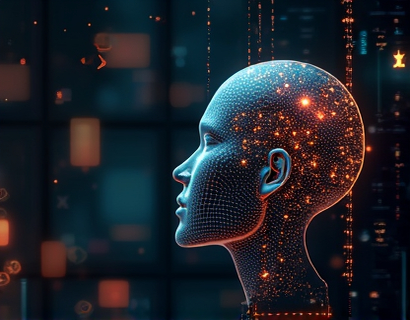Unlocking the Potential of Crypto and AI: A Synergistic Force for Next-Generation Digital Engagement
The intersection of cryptocurrency and artificial intelligence (AI) is giving rise to a new era of digital innovation, where the synergy between these two cutting-edge technologies is redefining user experiences and driving unprecedented growth in the tech sector. This article delves into the latest advancements and trends at this exciting juncture, offering deep insights for tech enthusiasts and professionals alike.
The convergence of cryptocurrency and AI is not just a technological curiosity but a powerful combination that is transforming how we interact with digital platforms. By leveraging the decentralized and secure nature of blockchain technology with the intelligent capabilities of AI, developers are creating more engaging, secure, and personalized user experiences. This synergy is particularly significant for platforms that aim to enhance digital engagement and foster growth in the ever-evolving tech landscape.
Enhanced Security through Cryptographic Techniques
One of the primary benefits of integrating AI with cryptocurrency is the enhanced security it provides. AI algorithms can analyze vast amounts of data to detect and prevent fraudulent activities, ensuring that transactions remain secure and trustworthy. For instance, machine learning models can identify patterns indicative of fraudulent behavior, such as unusual transaction volumes or locations, and flag them for review. This proactive approach to security is crucial in a digital environment where cyber threats are increasingly sophisticated.
Moreover, blockchain's inherent properties, such as immutability and transparency, complement AI's analytical prowess. The combination ensures that data integrity is maintained, and users can have confidence in the systems they interact with. This level of security is particularly important for applications in finance, healthcare, and other sensitive sectors where data protection is paramount.
Personalized User Experiences through AI-Driven Insights
AI's ability to process and analyze large datasets enables the creation of highly personalized user experiences. In the context of cryptocurrency and digital platforms, this means tailoring content, recommendations, and services to individual user preferences and behaviors. For example, a digital wallet app can use AI to analyze a user's transaction history and spending habits to offer personalized financial advice or suggest relevant investment opportunities.
Furthermore, AI-powered chatbots and virtual assistants can provide 24/7 customer support, answering queries and resolving issues in real-time. This not only enhances user satisfaction but also reduces the workload on human support teams, allowing for more efficient operations. The integration of natural language processing (NLP) in these AI systems ensures that interactions are seamless and intuitive, further elevating the user experience.
Decentralized Intelligence: AI on the Blockchain
Another fascinating area of convergence is the development of decentralized AI solutions on blockchain platforms. This approach, often referred to as decentralized intelligence (DeI), aims to distribute AI computations and data storage across a network of nodes, eliminating the need for centralized servers. This not only enhances privacy and security but also makes AI more accessible and scalable.
Decentralized AI models can be trained collaboratively by multiple participants, each contributing their computational resources and data. This collaborative approach can lead to more robust and accurate AI models, as they benefit from a diverse range of inputs. Additionally, the use of smart contracts ensures that data usage and model training processes are transparent and tamper-proof, fostering trust among users.
Use Cases of Decentralized AI
One prominent use case of DeI is in decentralized finance (DeFi) platforms, where AI algorithms can optimize trading strategies, manage risk, and predict market trends. These AI models run on blockchain networks, ensuring that the data and computations are secure and decentralized. Another application is in supply chain management, where AI can track and verify the authenticity of products, ensuring transparency and reducing the risk of fraud.
In the realm of content creation, decentralized AI can assist in generating high-quality content, such as articles, images, and videos, by leveraging the collective intelligence of the network. This democratizes content creation, allowing more voices to be heard and fostering a more diverse and vibrant digital ecosystem.
Crypto-Incentivized AI: Motivating Participation and Innovation
The integration of cryptocurrency into AI systems introduces a new paradigm of incentivization, where participants are motivated to contribute their resources and expertise through token rewards. This crypto-incentivized model can drive significant participation and innovation, as individuals and organizations are rewarded for their contributions to the AI ecosystem.
For instance, in a decentralized AI training network, users can earn tokens by providing computational power and data. These tokens can then be used to access premium services, participate in governance decisions, or traded on cryptocurrency exchanges. This creates a virtuous cycle where more participation leads to better AI models, which in turn attract more users and contributors.
Moreover, the use of utility tokens in AI applications can facilitate microtransactions and pay-per-use models, making advanced AI services more accessible to a broader audience. This democratization of AI technology can accelerate innovation and adoption, as more developers and businesses can leverage these tools without significant upfront costs.
Challenges and Considerations
While the synergy between cryptocurrency and AI offers numerous benefits, it also presents several challenges that need to be addressed. One of the primary concerns is the regulatory landscape, as both cryptocurrencies and AI are subject to varying degrees of scrutiny and regulation across different jurisdictions. Platforms must navigate these regulations carefully to ensure compliance and avoid legal pitfalls.
Another challenge is the technical complexity involved in integrating AI with blockchain systems. Developing scalable and efficient solutions that can handle the computational demands of AI while maintaining the security and decentralization of blockchain requires expertise in both domains. Collaboration between AI researchers, blockchain developers, and regulatory experts is essential to overcome these technical hurdles.
Future Trends and Innovations
Looking ahead, the convergence of cryptocurrency and AI is poised to bring about several exciting developments. One area of focus is the advancement of quantum computing, which has the potential to revolutionize both AI and blockchain technologies. Quantum computers can process complex calculations at unprecedented speeds, enabling more sophisticated AI models and faster blockchain transactions.
Another trend is the rise of AI-driven cryptocurrency management tools, such as automated trading bots and portfolio optimizers. These tools use AI to analyze market data, identify trends, and execute trades with minimal human intervention, making cryptocurrency investing more accessible and efficient for the average user.
Furthermore, the integration of augmented reality (AR) and virtual reality (VR) with AI and cryptocurrency is opening new frontiers in digital engagement. Imagine attending virtual concerts where tickets are bought and sold using cryptocurrency, and the experience is enhanced by AI-generated interactive elements and personalized content. This fusion of technologies can create immersive and memorable experiences that redefine how we engage with digital content.
Conclusion
The synergy between cryptocurrency and AI is a powerful force driving innovation and enhancing user experiences in the digital realm. By combining the security and transparency of blockchain with the intelligent capabilities of AI, we are witnessing the emergence of more secure, personalized, and engaging digital platforms. As this field continues to evolve, it is crucial for tech enthusiasts and professionals to stay informed about the latest advancements and trends, positioning themselves at the forefront of this exciting technological revolution.











































